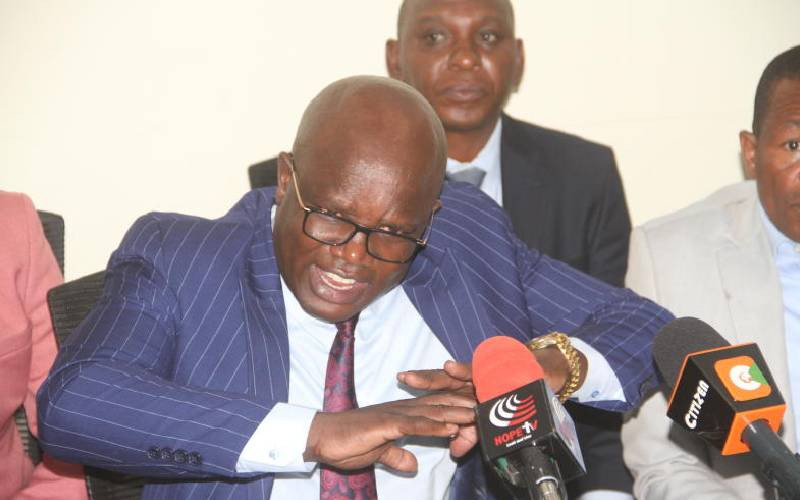
Doctors want a 300 per cent salary increment as stipulated in a collective bargaining agreement (CBA) signed in 2013.
This will see the lowest paid doctor pocket Sh342,000 and the highest paid pocket slightly over Sh940,000, up from the current Sh500,000 for the highest paid and Sh40,000 for the lowest paid. The doctor-patient ratio in Kenya now stands at 17 doctors for every 100,000 people, well below the World Health Organisation recommendation of 100 doctors for every 100,000 people.
Doctors and nurses in public health facilities moved to court on June 23, 2015 to compel the Government to honour the CBA.
The Kenya Medical Practitioners Pharmacists and Dentists Union (KMPPDU) in its application at the Employment and Labour Relations Court sought to compel the Ministry of Health to register the CBA officially in court. Doing so would make the CBA, which was signed on June 27, 2013, legally binding and enforceable.
Under the CBA, the lowest paid doctors in job group L would earn a monthly salary and allowances from between Sh325,730 and Sh342,770, up from between Sh127,910 and Sh149,880.
The highest paid doctors would take home between Sh852,180 and Sh946,000 per month in salary and allowances, up from Sh328,060 and Sh538,980.
House allowance would rise to between Sh30,000 and Sh120,000 depending on the job group, up from between Sh20,000 and Sh80,000.
Extraneous allowance would range between Sh60,000 and Sh100,000 per month, up from between Sh30,000 and Sh40,000, while commuter allowance would have gone up to between Sh20,000 and Sh50,000, up from between Sh6,000 and Sh16,000. Non-practising allowance would have remained at between Sh12,000 to Sh60,000 per month.
The CBA provided that all doctors in public facilities would work 40 hours per week. Any extra hours would be compensated.
During hearings before Justice Monica Mbaru, the lawyers from the Attorney General's Office, who represented the State and that of Salaries and Remuneration Commission, were given 14 days to respond to the KMPPDU application. They had requested the judge to give them more time to prepare a response.
Through their lawyers, doctors argued that on June 27, 2013, the Health Principal Secretary and officials from the AG chambers signed a CBA with KMPPDU officials. They told the court that following the execution of the CBA, the ministry had failed to register it in the Industrial Court to make it legally binding. They said it was the legal obligation of the ministry to register the CBA at the Industrial Court.
 The Standard Group Plc is a
multi-media organization with investments in media platforms spanning newspaper
print operations, television, radio broadcasting, digital and online services. The
Standard Group is recognized as a leading multi-media house in Kenya with a key
influence in matters of national and international interest.
The Standard Group Plc is a
multi-media organization with investments in media platforms spanning newspaper
print operations, television, radio broadcasting, digital and online services. The
Standard Group is recognized as a leading multi-media house in Kenya with a key
influence in matters of national and international interest.
 The Standard Group Plc is a
multi-media organization with investments in media platforms spanning newspaper
print operations, television, radio broadcasting, digital and online services. The
Standard Group is recognized as a leading multi-media house in Kenya with a key
influence in matters of national and international interest.
The Standard Group Plc is a
multi-media organization with investments in media platforms spanning newspaper
print operations, television, radio broadcasting, digital and online services. The
Standard Group is recognized as a leading multi-media house in Kenya with a key
influence in matters of national and international interest.









